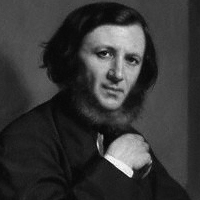The Bishop Orders His Tomb at St. Praxed's Church by Robert Browning: Summary and Analysis
The poem, 'The Bishop Orders His Tomb at St. Praxed's Church' begins with dramatic setting. An anonymous bishop lives on the verge of death. His sons who are most probably either his nephews or devotees, come around his bed without any interaction. They stand around his deathbed and listen to his speech.

Robert Browning (1812-1889)
The unnamed bishop begins his speech with negative comments upon old Gandalf, his enemy. According to him, Gandalf has a long term jealousy. He was also a religious guy who disturbs bishop's easy social life and religious one. Gandalf envied him because the bishop had once a fair beloved. After her death, he entered into the religious world where he was not given proper name and fame. Gandalf, as he says is the main cause of disturbance in his life. As the plot develops, we, reader are alert about his ironic existence and religious personality.
Commonly speaking religious people are assumed poor who decline their fascination towards materiality. The perused of chastity and eternity is the main target of their life. The "will power" of the religious person is lofty, they do not entice with so-called material prosperity and fame. Their virtues construct their solid identity. The case of Bishop has been just opposite to that of the common assumption. He entered into the religious world not due to his spiritual desire but due to his tragedy with beautiful women. Instead of enriching the church, he has participated in the act of looting his saints/sons to erect a sophisticated monument at Saint Praxed's Church. It is a religious place where the monuments of great religious people with lofty heart and great minds are constructed. He is neither a great religious person, nor fit for Saint Praxed's Church. But, he forcefully orders his sons to construct an unusual monument for him after his demise. Such a voice is ironic in tone. He is a religious virtue related to lapis lazuli. When the church was caught into fire, the bishop sneaked/steal lapis lazuli and kept it underground. The precious stone was, as he says, as being as a Jew's head, cut up at the neck. It is blue in color which is similar to that of the vein over the Madonna's breast. The Bishop orders his sons to dig-up the field, bring it back and place in between of his legs in the monument after his death. He asks them to put in between the legs so that his old enemy named Gandalf would look at his feet.
The irony in the life of Bishop also reflects in his deep fascination to pursue of materialist. Being a religious person, he has constructed resort named "Frascati Ville". He persuades his sons to heir the villa after his death. But they must fulfill his dream. He also persuades them with his honey tomb that he had trade good for all the goodness of their sons. As the listeners do not show their reaction, the speaker feels not only uneasy, but also comes up with suspense. He threatens them that he would reveal about his villa to the Pope, if they do not obey him. He orders listeners to go back in the queue and act out in accordance with his conception. Here we readers are untold whether they obey the Bishop or not. However, it is the million dollar question that his dreams would infertile. Hence, Browning presents a Bishop's true character through his speech. Since the poem uses all the major features of dramatic monologue, it is an epitome of dramatic monologue in itself.
Robert browning is best known for his brilliant dramatic monologues. It is a type of poem that consists of some unique features, which are: first dramatic setting. Like drama, a dramatic monologue unfolds with dramatic setting. A minute study of the poem enables us to know that the situation is who is speaking and what the subject matter is. Second, presence of speaker and listener: in a dramatic monologue, the poem comes as a form of speech. Though we find the presence of a listener, they do not produce their speech in the poem. As the poem develops, the speaker's real identity is revealed. Third, irony; all dramatic monologues summarize irony in figurative device. The development of the plot in the dramatic monologue leads readers to understand what his reality is. This gap manifests irony. Last, expression of intense feelings and emotions, the speaker in dramatic monologue mounts to the extremity and reveals realities with intense expression. The hitherto unrevealed sentiments are expressed openly in the poem. Browning's "The Bishop Orders his tomb at Saint Praxed's Church" typifies his dramatic monologue because we find all the defining qualities of monologue in it.
Related Topics
 |
bachelorandmaster.com |